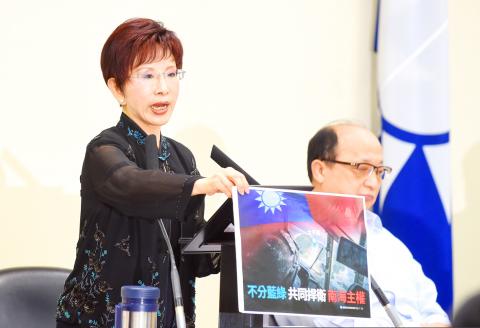The Chinese Nationalist Party (KMT) caucus yesterday called on the government to develop tourism and station more troops on Itu Aba Island (Taiping Island, 太平島).
KMT caucus secretary-general Lin Te-fu (林德福) urged President Tsai Ing-wen (蔡英文) to visit the island to defend the nation’s sovereignty, rather than just boarding a warship and then sending it to patrol the area.
Tsai yesterday inspected a Kang Ding-class frigate before it departed on a patrol mission to the South China Sea.

Photo: Liu Hsin-de, Taipei Times
“Taiping Island being downgraded to a rock is going to leave sequelae; its exclusive economic zone will be stripped, our logistics work might be restricted by the Philippines, and tensions with Manila will rise,” Lin said, adding that the government should open Itu Aba to tourists and see that there is fresh water, animal farming, vegetable growing and electricity production on the island.
KMT Legislator Alicia Wang (王育敏) slammed Tsai’s inspection as a stunt.
“The public wants to see her visiting the island to make clear the nation’s claim, not boarding a vessel — that means nothing,” she said.
During yesterday’s meeting of the legislature’s Foreign and National Defense Committee, Wang suggested that Minister of the Interior Yeh Jiunn-rong (葉俊榮) market bottled water from Itu Aba to let the world know that the island has a fresh-water source.
KMT Legislator Johnny Chiang (江啟臣) said Tsai’s administration seemed to have been caught offguard by the ruling.
Neither the premier nor the president have made a public address or held an international news conference, he said.
“We do not know how the government plans to respond to events in the wake of the ruling,” he said.
“The ruling has made possible the scenario in which nations compete to seize resources in the region, that could include natural gas, oil, minerals and fishing rights,” Chiang said. “It would be a state of nature in which might is the determining factor.”
“Now is a time where reasoning and laws are useless, as fists are what really counts,” KMT Legislator Lu Yu-ling (呂玉玲) said. “We should flex our military muscles, increase the number of missiles and troops on the island and stage live-fire military drills in the South China Sea.”
KMT Legislator Hsu Shu-hua (許淑華) took issue with the Japanese judge handling the South China Sea case, who she alleged “did not allow [Taiwanese] fishermen to sail within 200 nautical miles [370.4km] of the Okinotori atoll — which Japan claims is an island.”
“However, given that Taiping Island is 54,000 times larger than the Okinotori atoll, why then is the former a ‘rock’ and the latter an ‘island,’” she said.
Hsu also criticized Tsai for “not openly upholding ‘the U-shaped line’ in the belief that doing so would distance her from China and garner US support.
The “U-shaped line” refers to the Republic of China’s claim of sovereign territory in the South China Sea post-World War II, in accordance with agreements made in the Cairo Declaration of Nov. 27, 1943, and the Potsdam Declaration of July 26, 1945.
“The ruling has indicated that Taiwan cannot leave its diplomatic and cross-strait issues and its sovereignty to other countries,” Hsu said.

CHAOS: Iranians took to the streets playing celebratory music after reports of Khamenei’s death on Saturday, while mourners also gathered in Tehran yesterday Iranian Supreme Leader Ayatollah Ali Khamenei was killed in a major attack on Iran launched by Israel and the US, throwing the future of the Islamic republic into doubt and raising the risk of regional instability. Iranian state television and the state-run IRNA news agency announced the 86-year-old’s death early yesterday. US President Donald Trump said it gave Iranians their “greatest chance” to “take back” their country. The announcements came after a joint US and Israeli aerial bombardment that targeted Iranian military and governmental sites. Trump said the “heavy and pinpoint bombing” would continue through the week or as long

TRUST: The KMT said it respected the US’ timing and considerations, and hoped it would continue to honor its commitments to helping Taiwan bolster its defenses and deterrence US President Donald Trump is delaying a multibillion-dollar arms sale to Taiwan to ensure his visit to Beijing is successful, a New York Times report said. The weapons sales package has stalled in the US Department of State, the report said, citing US officials it did not identify. The White House has told agencies not to push forward ahead of Trump’s meeting with Chinese President Xi Jinping (習近平), it said. The two last month held a phone call to discuss trade and geopolitical flashpoints ahead of the summit. Xi raised the Taiwan issue and urged the US to handle arms sales to

State-run CPC Corp, Taiwan (CPC, 台灣中油) yesterday said that it had confirmed on Saturday night with its liquefied natural gas (LNG) and crude oil suppliers that shipments are proceeding as scheduled and that domestic supplies remain unaffected. The CPC yesterday announced the gasoline and diesel prices will rise by NT$0.2 and NT$0.4 per liter, respectively, starting Monday, citing Middle East tensions and blizzards in the eastern United States. CPC also iterated it has been reducing the proportion of crude oil imports from the Middle East and diversifying its supply sources in the past few years in response to geopolitical risks, expanding

Pro-democracy media tycoon Jimmy Lai’s (黎智英) fraud conviction and prison sentence were yesterday overturned by a Hong Kong court, in a surprise legal decision that comes soon after Lai was jailed for 20 years on a separate national security charge. Judges Jeremy Poon (潘兆初), Anthea Pang (彭寶琴) and Derek Pang (彭偉昌) said in the judgement that they allowed the appeal from Lai, and another defendant in the case, to proceed, as a lower court judge had “erred.” “The Court of Appeal gave them leave to appeal against their conviction, allowed their appeals, quashed the convictions and set aside the sentences,” the judges